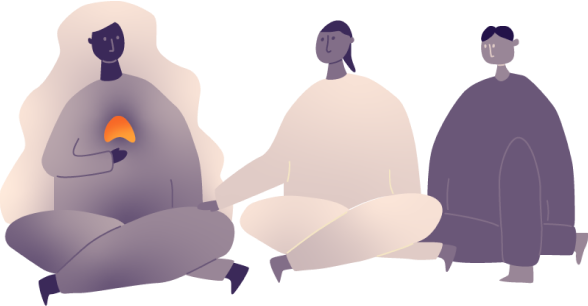Awhi is still in development, we'd love your feedback and suggestions. Let us know.
What to do when you or your child can't sleep
When researching a piece, I always start at a basic google to make sure I get an idea of what most people find when they ask Google for help. For this piece, I searched “sleep disorders nz" and Google suggested these:
- What are the five types of sleep disorders?
- What are the six types of sleep disorders?
- What are the seven sleep disorders?
- What are the four sleep disorders?
This was a pretty big hint that there’s a lot of conflicting info out there!
So we decided that we’d do a series on Sleep!
Part one is about trouble sleeping, part two will cover options for treatment and support, part three will cover neurodivergence and sleep, and part four will go over the differences between “trouble sleeping” and diagnosable sleeping disorders.
**Not all sleep issues are the same. **Some find it difficult to get to sleep, others find it difficult staying asleep, and some people seem to be sleeping okay but aren’t actually getting as much rest as they ought to be.
Common Comorbidities* with Sleep Issues
If you or a member of your whanau have some of these health conditions, there may be difficulties with sleep.
- Chronic pain
- Diabetes
- Heart conditions (e.g. high blood pressure)
- Pulmonary conditions (COPD, sleep apnoea, and so on)
- Neurodivergent diagnoses (Autism, ADHD, anxiety, and so on)
Unfortunately, these issues can be self-perpetuating – for example, lack of sleep can lead to high blood pressure which in turn makes getting to sleep more difficult. When discussing the treatment and management of any health issues with your doctor, it can pay to ask what impact the health issue and the proposed treatments might have on sleep.
*the simultaneous presence of two or more diseases or medical conditions in a patient.
(NOTE: the goal of this piece is to provide advice, but this advice may not be suitable for those with a diagnosed sleep disorder.)
There is no single reason that people have difficulty getting to sleep and so there is no single solution, but too much stimulation close to bedtime is a common cause of difficulty getting to sleep. External stimulation could include loud or pervasive noise, too much light, being too hot or too cold, or an uncomfortable bed.
Internal stimulation can also keep someone awake and could include recent ingestion of caffeine or sugar, rushing or intrusive thoughts (such as that experienced by those with anxiety or ADHD), and bodily discomfort such as gastrointestinal or bladder issues.
**Creating an Evening Wind-Down Routine really can help, **especially if you suspect your child’s sleeping issues have been triggered by some other disruption in their life.
Some of this might be known to you already, but it bears repeating.
**Avoid chemical stimulants: **The obvious ones are caffeine and sugar but endorphins from exercise can also keep you awake. If your whānau go for walks in the evenings, try to do it early enough that everyone’s bodies can return to baseline before trying to sleep.
**Ensure everyone is comfortable: **We sleep best in environments that are cool, dark, quiet, and comfortable.
If curtains are too thin and letting in light (especially in summer evenings), pin a sheet to the window frame to block more light. You can also get blackout curtains, though they can be expensive.
If your bedrooms get afternoon or evening sun, pin up the sheet earlyish so the room has a chance to cool down before bedtime.
Check what your sheets and duvet covers are made of – retailers often sell blends of polyester and cotton which hold the heat in and can feel scratchy. Look for 100% cotton sheets and duvet covers, and cotton or wool duvet inners. Avoid polyester and other synthetic fabrics.
Have a shower or bath before bed, or use a cool flannel to wipe down faces, arms and legs. A cool flannel on the back of the neck for a few minutes can feel heavenly.
**Avoid naps: **Obviously we’re not saying stop your young ones from napping, but if you have an older child who’s started struggling to sleep at night, try to keep them awake through the day so they don’t throw their body off their normal sleeping rhythm.
**Be active during daytime: **Bodies don’t want to sleep if they’re not tired, ergo it’s important that we are active enough that we actually need to rest.
**Get sunshine: **We take our cues from the sun as to whether or not we’re supposed to be awake. Being exposed to the sun during the day helps our brains and bodies recognise that it’s time to sleep when it’s dark.
.jpeg&w=128&q=75)
Tam Clemerson
I'm Tam Clemerson. I am a queer neurodivergent parent. I grew up in Wellington and did my dash in the public service before moving into union advocacy. I am currently studying Law at Vic Uni and spend my time juggling lectures and readings with swimming lessons and football games.
Was this resource helpful to you?


The Awhi Ngā Mātua team would like to thank Takai, the IHC Foundation and the Dines Family Charitable Trust for their generous contributions to our work. A huge thank you also to the IHC Programmes team, in particular the IHC Library which has worked so hard to make their remarkable collection available to us.




.jpeg&w=3840&q=75)




